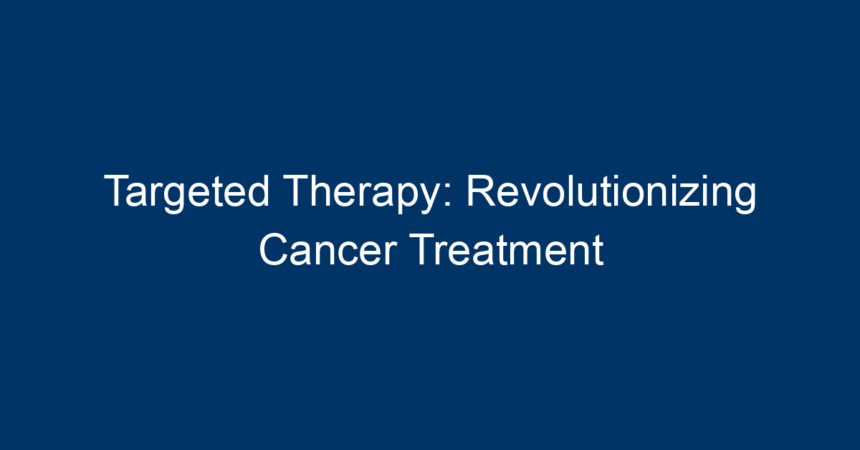Cancer is one of the leading causes of death worldwide, affecting millions and their families every year. Traditional treatments like chemotherapy and radiation have been the cornerstone of cancer care, but they often come with severe side effects and limited success rates. Enter targeted therapy, a groundbreaking approach that’s changing the landscape of cancer treatment. This article delves into what targeted therapy is, how it works, its advantages over conventional treatments, and what the future holds for this revolutionary approach.
What is Targeted Therapy?
Targeted therapy refers to a type of cancer treatment that uses drugs or other substances to precisely identify and attack cancer cells, while sparing normal cells. Unlike traditional therapies that affect both healthy and cancerous cells, targeted therapies focus on specific genetic, molecular, or cellular characteristics of cancer. This tailored approach enhances the effectiveness of treatment and minimizes harm to healthy tissues.
Key Characteristics of Targeted Therapy
-
Molecular Targeting: Targeted therapies are designed to target specific molecules involved in the growth and spread of cancer cells. This includes proteins, genes, or even tissue environments that support tumor growth.
-
Personalization: Every cancer is unique. Targeted therapy utilizes genetic testing and biomarkers to personalize treatment plans, ensuring the right patients receive the right drugs based on their cancer’s genetic profile.
- Less Toxicity: By homing in on cancer cells specifically, targeted therapies tend to have fewer side effects than traditional methods. This feature can significantly improve patients’ quality of life during treatment.
How Does Targeted Therapy Work?
Targeted therapies work by blocking the growth and spread of cancer by interfering with specific molecules needed for tumor growth. Here’s how they typically operate:
1. Blocking Signals:
Many cancer cells rely on certain signals to survive and proliferate. Targeted therapies can disrupt these signaling pathways, inhibiting cancer growth. For instance, monoclonal antibodies can bind to cell surface receptors and prevent signals that instruct cells to divide and multiply.
2. Interrupting Tumor Growth:
Some targeted therapies work by directly blocking the growth of blood vessels that tumors need to survive, known as anti-angiogenic therapy. By limiting the tumor’s blood supply, the cancer cells can’t grow as effectively.
3. Inducing Cell Death:
Certain targeted agents can trigger apoptosis (programmed cell death) in cancer cells. By promoting self-destruction mechanisms, these therapies can effectively reduce tumor size or eliminate cancer cells entirely.
Types of Targeted Therapies
There are several types of targeted therapies available, each serving different functions in cancer treatment. Some of the most common include:
1. Monoclonal Antibodies:
These lab-engineered molecules are designed to attach to specific proteins on the surface of cancer cells. For example, Trastuzumab (Herceptin) is a monoclonal antibody used to treat HER2-positive breast cancer.
2. Tyrosine Kinase Inhibitors (TKIs):
These drugs inhibit the action of an enzyme called tyrosine kinase, which plays a critical role in signaling pathways leading to cancer cell growth. Disatinib and Imatinib are notable TKIs used in treating leukemia.
3. Hormone Therapies:
Some cancers, like breast and prostate cancers, depend on hormones to grow. Targeted hormone therapies can block these hormones or their receptors, stalling the cancer’s progression.
4. Checkpoint Inhibitors:
These therapies help the immune system recognize and attack cancer cells. By inhibiting checkpoint proteins that block immune responses, these treatments enable the body’s defenses to work more effectively against tumors.
Advantages of Targeted Therapy
The shift toward targeted therapy is accompanied by a variety of benefits that set it apart from traditional cancer treatments:
1. Efficacy:
Targeted therapies have shown improved efficacy in certain cancers. Patients often experience better outcomes and higher rates of remission.
2. Fewer Side Effects:
By focusing exclusively on cancer cells, targeted therapies typically result in fewer side effects compared to chemotherapy and radiation. This aspect fosters better adherence to treatment and improves the overall patient experience.
3. Combination Approaches:
Targeted therapy can be combined with other treatments, such as chemotherapy, to enhance effectiveness. This multi-faceted approach can address cancer from various angles, often leading to better outcomes.
4. Improved Monitoring:
Targeted therapies frequently incorporate biomarkers, allowing for real-time tracking of treatment effectiveness. These metrics can be invaluable for adjusting therapies as needed.
Challenges and Limitations
While targeted therapy has transformed cancer treatment, it is not without challenges:
1. Resistance:
Similar to traditional therapies, some cancer cells can develop resistance to targeted therapies over time, necessitating ongoing research into new strategies.
2. Access and Affordability:
Targeted therapies can be costly and may not be covered by all insurance plans. This economic barrier can limit patient access to potentially lifesaving treatments.
3. Complexity of Cancer Genetics:
Not all cancers have well-defined molecular targets, and variations in genetic makeup can make it difficult to predict individual responses to therapy.
The Future of Targeted Therapy
The landscape of cancer treatment continues to evolve with ongoing research and technological advancements. The future of targeted therapy looks promising, with several key trends on the horizon:
1. Personalized Medicine:
The trend towards more personalized treatment regimens is likely to continue growing. Advances in genomics and proteomics will enable efficacious strategies tailored specifically for each individual, improving treatment effectiveness.
2. Combination Therapies:
As researchers better understand how different therapies interact, combination treatments that incorporate targeted therapies alongside immunotherapy or traditional therapies may yield better outcomes.
3. New Technologies:
Investments in artificial intelligence and machine learning are poised to revolutionize the identification of new therapeutic targets and optimize treatment protocols.
Conclusion: Embracing the Revolution
Targeted therapy is undeniably revolutionizing cancer treatment, offering hope and improved outcomes for patients where traditional methods have fallen short. Its ability to provide personalized, efficient, and less toxic treatment regimens is a significant advancement in cancer care.
As awareness of targeted therapy increases, patients are encouraged to discuss this option with their healthcare providers. Genetic testing and advocacy for personalized treatment plans can be invaluable steps toward better health outcomes.
In this evolving landscape, staying informed and engaged in one’s health is crucial. Empowering yourself with knowledge about targeted therapy could be the catalyst for navigating the complexities of cancer treatment effectively. Let’s embrace this revolution together, transforming lives and futures across the globe.




